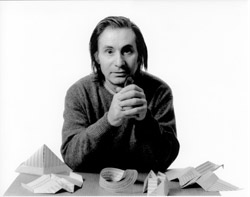New to the British stage, Alan Bennett’s “The Habit of Art”
tells of a (fictional) visit in 1972 in Oxford between the onetime artistic collaborators Auden, who would die the next year, and Britten that finds room within it for the competing attentions of a rent boy (Stephen Wight), whom Auden has hired for a frolicsome bit of fellatio, and of Humphrey Carpenter (Adrian Scarborough), both men’s real-life biographer, who is on hand to dispense important bits of narrative and raise questions about “the shortcomings of great men.â€
Meanwhile, the British remain privy to the greatest, boldest artistic festival in recent memory: the London Philharmonic’s “Between Two Worlds” festival, featuring the music of Alfred Schnittke. Not surprisingly, the mainstream media across the pond is just as dunderheaded as it is here:
It seems a trifle self-indulgent of Jurowski to follow up this fiasco so soon with another hugely costly and equally bizarre mish-mash of mysticism and doggerel – Alfred Schnittke’s opera-cantata The History of D Johann Faustus, unperformed since its Hamburg première in 1995.
Um, did you just call Al Schnittke “doggerel“? Burn. I’ll let my readers be the judge:
The Faustus score embraces everything from pseudo-Bachian chorales and declamatory recitative in the style of the Passions through the manic depressive symphonies of Mahler and Shostakovich to Weill’s cabaret songs and even, I felt, a touch of Lloyd Webber schmaltz.
Wow, is that what you felt, Rupert? Well you must be like really, really smart to hear all of those things. I’m just overwhelmed. Did you also write this review?
I am so exasperated to find that the Evansville, South Dakota Volunteer Fire Department Symphony Orchestra has mandatorily decided to perform the cacophoneuous gross concertoes of the communist Alfred Schnittke.
What is wrong with the pomp and fireplace of Elgar? Or a rousting rendition of John Williams scores? The Conductor of the Symphony promised us Scheherazade and Paganini’s Violin Concerto Number One.
I did not purchase my season tickets to the ESDVFDSO to be treated to a barrage  of communist music .
This Schnittke is hurting my ears. Help me.
But seriously, much of the press concerning this festival brings up a larger critical problem concerning Schnittke and his music: that he is inevitably compared to Shostakovitch. Folks, this has simply got to stop. Because let’s be honest — objectively, Schnittke is a way better composer. Like, orders of magnitude better. Yes, they both lived in Soviet Russia, and Shostakovitch was certainly an influence on AS, but Schnittke is working on a whole different level, and the musical and extra-musical issues associated with his music are a total different beast.
